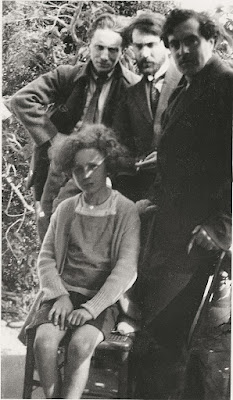Viaggio in Italia
Viaggio in Italia (1954), dir Roberto Rossellini, starring Ingrid Bergmann, George Sanders
Paul Murphy, Berlin
The Rossellini season at the Arsenal cinema, Berlin continues with Viaggio in Italia. The film sets up a set of contrasts. Bergmann´s interest, possible obsession with history, visiting museums, investigating the past. George Sanders interest in fun which might consist of things less boring, one assumes music, drink, drugs, sex, gambling. A journey to Italy very much sets up an encounter with the past, not only The Past but also one´s own past. Bergmann´s experience of Italy might be compared with Goethe´s Italian Journey, which consisted in an attempt to unite more recent Germanic culture with the ancient past of Rome (and Greece). So the film is an essay about Northern Europeans losing their connections with the past, re-visiting ancient sites to re-establish those connections.
The film is largely set in and around Naples. Katherine Joyce and Alexander 'Alex' Joyce go there to dispose of a deceased uncle's villa. Their relationship is not going terribly well. The journey to Naples seems to bring tensions to the surface even more. Personal memories are underscored when Katherine remembers a poet who loved her and died in the war. Instead of really living she tours the museums of Naples and Pompeii, immersing herself in history, wishing for a child, noticing how many women are pregnant. Alex goes to Capri, seeks out other women. They talk about a divorce. This is a film that clearly depends on sensitive acting for it´s effects rather than any kind of plot excitement. In this sense it resembles Climates. Indeed there are excellent performances from both leads. Bergmann brings with her most of the expectations set up in films like Giovanna d'Arco al rogo, a woman more saint than flesh and blood. But in this film she is incarnated, certainly, capable of making choices, her investigation of the past is a remorse-filled attempt to deal with personal mortality. Her husband clearly has no way of contending with abstractions. She is the stronger, more interesting character. He is merely fascinated by all of the many distractions, titillations, irrelevancies of life on Capri. There is a clear sense of development for Katherine in the film but Alexander mostly remains unchanged by the effects of the journey. The film draws clear connections between both characters, underscored by their response to what is mutable or static around them, clearly leading us into sympathy for Katherine but a rather more ambivalent attitude towards Alexander. The subtle message is that journeys do not always change us, that we must feel the need to change ourselves ultimately, that environments, experiences do not always imply personal development. For this reason the ending implies a sense of disbelief about the suitability of the two protagonist´s for each other.

Comments